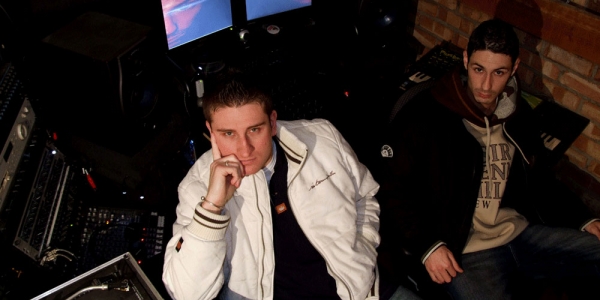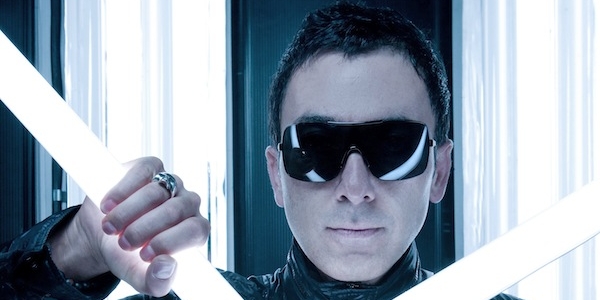It seems surprising that so many of drum and bass’ earlier figures seem to be abandoning the breakneck tempo for more traditional genres – evident in the slew of recent releases from producers including the likes of dBridge, ASC and plenty of others, who’ve all recently found themselves enamoured by the realm of possibility presented by techno, garage and beyond – and when I get on the phone to one half of the duo, Brett Bigden, it seems that Kryptic Minds are yet another act to join in on this expansion of ideas.
“The whole bass music thing is more open now than it ever was, and drum and bass is just one form of that music,” Bigden points out. “I think people in general are quite creative and if you stick to one thing, one tempo, it can be very limiting, very restricting. And some of the people who’ve been doing this for a long time, I think it’s easy to get not bored of the music, because it’s not that kind of music, but it gets a bit stale, and this bass music thing is a breath of fresh air.”
Asked what drove them to become interested in the half-step rumblings of bass music that they’re now so well-known for, Bigden explains it was a natural progression for them. “I think, as much as anything else, it began with age,” he says. “We both got older, which meant that the music we were making at the time (which was drum and bass) [seemed] so quick. We were going into the studio one day and listening to the tunes we were making – not knowing about dubstep at all initially, we just started experimenting with drum and bass at 140BPM. We slowed down what we were doing and found there was a lot more room for different noises, effects – the whole groove has a completely different feel. We discovered this music called dubstep, which was the same sort of tempo nod we branched off it, straight into that sound. Drum and bass is very drum-oriented with its fills and everything else; dubstep doesn’t have that, it’s a lot more minimal. Initially it was a bit of a shock when we had to leave the fills out and lose the breaks,” we laugh, before he continues, “but no – it’s been good, we really enjoy it.”
Kryptic Minds’ approach to bass music is heavily steeped in a less-is-more ideology – while others emphasise the heavy basslines and the pounding drums that characterise the output of many of their contemporaries, the endless, blacked-out spaces of albums such as One Of Us and Can’t Sleep are an exercise in minimalism. Sparse and tension-riddled, the duo demonstrate a keen understanding of the power of the pared-back combined with the ambient noises of cities after midnight. “I’ve always been a geek when it comes to the technical side of production,” he muses. “I’ve spent a lot of time learning about equipment, learning about sounds, reading books and things so yeah, I do believe strongly in focusing on what you put into the songs in terms of sound. I’m a strong believer in this idea that you create this sound, it’s your sound – do you know what I mean? What you put in is what you get out, definitely.”
The duo are no stranger to the business side of the music industry, either, having ran a number of record labels together, including the currently-thriving Osiris Music, home to their more recent releases as well as an excellent selection of the up-and-coming. Always defiant and unwilling to be restricted by the confines of genre tags, their intent in establishing this most recent imprint echoes the sentiments expressed in their rationalisation of dubstep’s place in the music scene at present. “This is our fourth record label over the years – we’ve been doing this for about 15, 16 years now, so we’ve had a few of them,” he explains. “But they’ve always seemed to be pigeonholed. That’s what we didn’t like about when we had Defcon, which was a secondary kind of thing; it got very put in a corner, which we felt gutted by. Because as far as we were concerned, we just did our thing, and for people to just then label it as one style of music and one kind of sound was a bit of a shame.”
The releases to Osiris’ name so far are impressive, spanning a wide spectrum of tempos and moods. Asked about where they envision taking Osiris over the next few years for both themselves and the artists they house, he’s optimistic. “Osiris is us taking it in a more open direction – we could put out our own tunes, because we’ve always felt very strongly about how we feel about our music and we wanted to put out music that was unrestricted. We could put out what we wanted to put out when we wanted to, which is important because it means you can keep being creative because you don’t have to fit into somebody else’s agenda or sound. Osiris was put in place so we could release all of this dubstep, and other styles of music as well. We did a few drum and bass releases in the beginning, and it was always to remain open in regards to putting out other electronic pieces, or maybe even a rock piece if we wanted to. The idea was to have a music label – rather than a dubstep or genre-specific label.”
BY MIKI MCLAY

